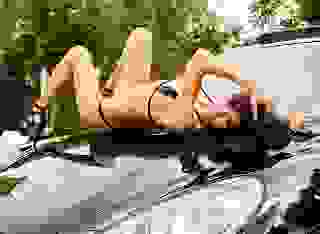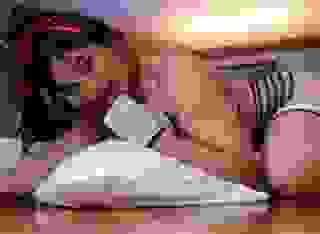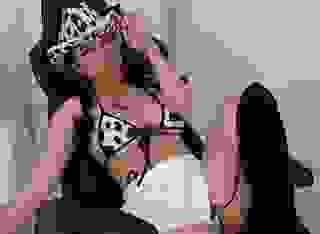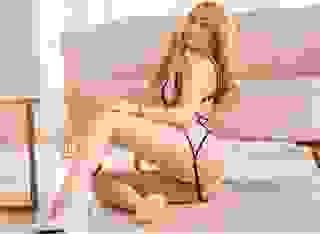Note: You can change font size, font face, and turn on dark mode by clicking the "A" icon tab in the Story Info Box.
You can temporarily switch back to a Classic Literotica® experience during our ongoing public Beta testing. Please consider leaving feedback on issues you experience or suggest improvements.
Click here"Hi, Trish."
"Hi, Soupy." It was a red-haired, freckle-faced sophomore that I had three times turned down for dates. He made no comment about my black and blue face--although it obviously killed him not to. "Cash a check for me?" I asked.
"How much?"
"A hundred bucks."
"Well--I suppose so. Is it a good check?" he asked playfully.
"Not very. It's my own."
"Well, I'll invest in it as a curiosity if it bounces." He counted out a four twenties, a ten, a five, and five ones. "Besides, it has your address and telephone number on it," he said.
"It still won't get you date. But hang on to it anyway: my autograph might be a rare collectors' item some day."
I took the money and proceeded to the bookstore in the same building. Most of the books on the list were there for sale. Ten minutes later I had acquired title to:
"The Prince," by Niccolo Machiavelli.
"Behind the Ballots," by James Farley.
"How to Win Friends and Influence People," by Dale Carnegie.
"It Takes a Village," by Hillary Roddam Clinton.
The other titles I wanted were not available in the bookstore. I went from there to the university library where I drew out "Real Estate Broker's Manual," "History of Musical Instruments," and a volume titled "Evolution of Dress Styles." The latter was a handsome book with beautiful colored plates and was classified as a reference. I had to argue a little to get it out on a twenty-four hour permission.
I was fairly well loaded down by then; I left the campus, went to a pawnshop on Route One and purchased two used, but sturdy suitcases, into one of which I packed the books. From there I went to the largest music store in College Park and spent forty-five minutes selecting and rejecting old tunes, with emphasis on swing and ragtime and jazz--highly emotional stuff, all of it. I did not neglect classical and semi-classical, but applied the same rule to those categories--a piece of music had to be sensuous and compelling, rather than cerebral. No Heavy Metal, no Rap or Pop. My collection included such strangely assorted items as the "Marseillaise," Ravel's "Bolero," four Cole Porter tunes, and "L'Apres-midi d'un Faune." I bought nothing later than the 1940's.
I found a CD player with a solar panel built into the top. I bought two, along with a scad of rechargeable D-cell batteries. I wrote a check for the lot, packed it all in my suitcases, and had the clerk call me a taxi.
I had a bad moment over the check because the one I had cashed at the Students' Co-op had cleaned out my account. But the phone lines were down and with it the store's TeleCheck system; I had just established, I reflected, the all-time record for bouncing checks--thirty thousand years.
When the taxi drew up opposite the court where I had located the Gate, I jumped out and hurried in.
The Gate was gone.
* * *
I stood there for several minutes, whistling softly, and assessing--unfavorably--my own abilities, mental processes, and the consequences of writing bad checks under the present circumstances.
I felt a touch at my sleeve. "Young lady, do you want the cab, or don't you? The meter's still running, you know."
"Yes," I said distractedly, picking up the suitcases. I followed the driver back to the cab.
"Where to?"
That was a problem. I glanced at my watch, then realized that the usually reliable instrument had been through a process which rendered its reading irrelevant. "What time is it now?"
"Twelve noon." I reset my watch.
Twelve noon. The original Trish was right now in her room, awaiting the jamboree. It would not start until sometime just after two o'clock but I didn't want to go there--not until my blood-sisters got through playing fun games with the Gate.
The Gate!
It would be in the room until sometime after four fifteen! If I timed it right--
"Drive to the corner of Cleveland and Eisenhower," I directed, naming the intersection closest to my dorm.
I paid off the taxi driver there, lugged my bags into the Student Union building across the street, where I obtained permission from the receptionist to leave them and assurance that they would be safe. Although I had nearly four hours to kill, I was reluctant to go very far from the dorm for fear some hitch would upset my timing. Then it hit me.
Gregory.
I walked briskly to a point two blocks away, where Eisenhower intersected Route One, blundered onto a cab disgorging a group of four, giggling teenage girls at a record shop, and gave the driver directions to an apartment building two miles away.
In response to my knock, the peephole in the door of Apartment 211 darkened. Then the door was flung wide and Gregory exclaimed. "Trisha! I thought you were working today!"
"I decided to take some time off. Caffeine-brain, you know?" I made a cross-eyed, pinched-faced imitation of a mental-ward patient.
"I don't know," Greg said solemnly, looking back over his shoulder. "I wasn't expecting you. I haven't washed the dishes, or made up the bed. And I was just putting on my make-up."
"Don't be coy." I pushed the door open wide, and went in.
* * *
Standing on the front porch of Gregory's building some time later, I glanced at my watch. One fifty-five. I waited for my taxi, feeling like the cat that had got eaten by the canary. No wonder Gregory was enraged. Or would be enraged. I felt like a slut.
After checking on my bags, I borrowed a quarter from the Student Union receptionist and crossed to a phone booth across the street. I dialed my own number.
"Hello," I heard.
"Trish. Is this Trish Wilson?"
"Yes. Who is this?"
"Never mind," I said. "I just wanted to be sure you were there. You've got quite an afternoon ahead of you, girl. Keep a stiff upper lip, okay?" I replaced the receiver with a joyless chuckle.
The afternoon dragged on and on. At four-o'clock, I was too nervous to wait any longer. Struggling under the load of the heavy suitcases, I made my way to the dorm. I took the elevator to the third floor, climbed the stairs to the fourth--that old elevator made the most horrendous racket--got out and heard a telephone ringing down the hall. It rang and rang. I glanced at my watch. Four ten. I waited in the hall for three interminable minutes, realized with a start whose footsteps in the hallway outside my door had chased me through the Gate and pressed the elevator call button. When the noisy old monster arrived, I waited for the doors to open, then clank back shut again, then labored down the hall under the weight of my books. I unlocked the door and let myself in.
The room was empty; the Gate was still there.
Without stopping for anything, filled with apprehension lest the Gate should suddenly blink out of existence while I crossed the room, I hurried to it, took a firm grip on my bags, and stepped through to the other side.
The Hall of the Gate was empty. Just five minutes, I told myself, that's all I ask. Five uninterrupted minutes.
I set the suitcases down near the Gate to be ready for a quick departure. As I did so I noticed that a large slice was missing from a comer of one case. Half a book showed through the opening, sheared as neatly as with a printer's trimmer. I identified it as "How to Win Friends and Influence People."
I did not mind the loss of the book but the implications made me slightly sick at my stomach. Suppose I had not described a clear arc when I had first been knocked through the Gate, had hit the edge, half in and half out? Woman Sawed in Half--and no illusion!
I wiped my face and went to the control booth. Following Leda's simple instructions, I brought all four spheres together at the center of the tetrahedron. I glanced over the side of the booth and saw that the Gate had disappeared entirely. "Check!" I thought. "Everything on zero--no Gate."
I moved the white sphere slightly. The Gate reappeared. Turning on the viewscreen, I was able to see through the miniature scene the inside of the Hall of the Gate itself. So far so good--but I would not be able to tell what time the Gate was set for by looking into the Hall. I displaced a globe slightly and the scene flickered past the walls of the palace and hung in the open air. Returning the white time control to zero, I then displaced it very, very slightly. In the miniature scene the sun became a streak of brightness across the sky; the days flickering past like some effect in a science-fiction movie. I increased the displacement a little, saw the ground outside become brown and sallow, then snow covered, and finally green again.
Working cautiously, steadying my right hand with my left, I made the seasons march past. I had counted ten winters when I became aware of voices somewhere in the distance. I stopped and listened, then very hastily returned the spatial controls to zero, leaving the time control set as it was--set for ten years in the past--and rushed out of the booth.
I hardly had time to grasp my bags, lift them and swing them through the Gate, myself with them, as the sound of voices entered the room. This time, I was exceedingly careful not to touch the edge of the circle.
I found myself, as I had planned to, still in the Hall of the Gate. But, if I had interpreted the controls correctly, I was ten years in the past. I had intended to give Leda a wider berth than that, but there had been no time. But since Leda was, by her own admission and the evidence of the little notebook I had lifted from the machine, a native of the twenty-first century, it was quite possible that ten years was enough. She might not be in this era. If she was, there was always the Time Gate. Caution, however, told me it was reasonable to scout out the situation first before making any more jumps.
In retrospect, it seemed obvious to me that I should have brought along enough food to last me a day or two, and maybe a gun. I had not been very foresighted. But I easily forgave myself for that--it was hard to be foresighted when the future kept slipping up behind one like this.
"All right, Trish," I told myself aloud, "let's see if the natives are friendly--as advertised."
A cautious reconnoiter of the part of the Palace I was acquainted with turned up no human beings, no life of any sort, not even insect life. The place was dead, sterile, as static and unlived-in as a window display. I shouted once, just to hear a voice. The echoes caused me to shiver. I did not do it again.
The architecture of the place was confounding. Not only was it strange beyond my twenty-first century experience--I had expected that--but the place, with minor exceptions, seemed totally unadapted to the uses of human beings. There were great halls, large enough to hold ten thousand people at once--had there been floors in them to stand on. In following one long passageway I came suddenly to one of the great mysterious halls and almost fell in before I realized that the passage had terminated. I crawled gingerly forward and looked over the edge. The mouth of the passage terminated high up on a shear, vertical wall. Far below, the wall curved out and intersected with the wall on the opposite side--not in a horizontal plane, but at an acute angle that defied reason. There were other openings scattered around the walls, openings just as unserviceable to human beings as the one in which I crouched.
"The High Ones," I whispered to myself. All my cockiness had fled me. I retraced my steps through the passageway and reached the almost friendly familiarity of the Hall of the Gate.
On my second try I attempted only those passages and compartments which seemed obviously adapted to human beings. I had already decided what such parts of the Palace must be . . . servants' quarters. I regained my courage by sticking to areas such as these because, even though completely deserted, by contrast with the rest of the great structure, a room or a passage that had been built for men seemed absolutely cheerful.
Twelve hours later, hungry, thirsty, my legs aching from the continual searching and my eyes threatening to glue themselves closed, I had almost come to despair in my hopes of finding a way out of the Palace. Then, suddenly, the corridor I was following turned right and I found myself standing in bright white sunlight.
"Oh, thank God," I breathed, tone almost reverential.
I stood at the top of a broad steep ramp which spread fan-like down to the base of the building. Ahead of me and below, at least five hundred yards down, the surface of the ramp met the green of earth and bushes and trees. It was the same placid, lush, and familiar scene I had looked out over when I breakfasted with Leda--a few hours ago and ten years in the future.
I stood quietly for a short time, drinking in the sunshine, soaking up the heart-lifting beauty of the warm, autumn day. "This is going to be all right after all," I told the beautiful morning. "I just know it is."
I moved slowly down the ramp, my eyes searching for human beings. I was halfway down when I saw a small figure emerge from the trees into a clearing near the foot of the ramp. I called out to it in joyous excitement and the child--it was certainly a child--looked up, stared at me for a moment, then fled back into the shelter of the trees.
"Wait!" I yelled, and then shut my mouth. "Don't scare them, Trish. Take it easy." But I was heartened by the incident. Where there were children there would be adults: parents, society, opportunities for a bright, young woman who took a broad view of things to get ahead. I moved on down at a leisurely pace.
A woman showed up at the point where the child had disappeared. I stood still. The woman looked at me for a time, then advanced hesitantly a step or two.
"Please come," I invited in a friendly voice. "I won't hurt you."
The woman could hardly have understood my words, but she advanced slowly. At the edge of the ramp she stopped, eyed it apprehensively and would not proceed farther.
Something about her behavior clicked in my brain. "Unless I'm wrong," I said in a conversational tone, "and the time I spent in Anthropology 101 was totally wasted, this Palace is taboo to you, and the ramp I'm standing on is taboo."
And, by association, I was taboo too.
"Play your cards, Trish. But not all of them at once."
I advanced to the edge of the ramp, careful not to step off it. The woman dropped to her knees and cupped her hands in front of her, head bowed in the same manner as had Arma. Without hesitation, I touched her on the forehead and the woman got back to her feet, her face radiant.
"This is despicable," I murmured. "I should be shot."
My new servant cocked her head, looked puzzled, and answered, in a light, melodious voice. The words were liquid and strange and sounded like a phrase from a song.
"You ought to be on American Idol," I said admiringly. "Most of them got on with far less talent than you." I pointed to my mouth, made exaggerated chewing motions, and rubbed my belly. "Food?"
The woman looked hesitant, spoke again, and I remembered the book. I looked up "eat," then looked up "food," and found it was the same word. "Blellan," I said carefully.
"Blellaaaan?"
"Blellaaaan," I agreed. "You'll have to excuse my accent. I'm was lousy at French."
I tried to find "hurry" in the vocabulary, but it was not there. Either the language did not contain the idea or Leda had not thought it worthwhile to write it down. I found the word for "bring"--Egmorey--and the woman departed.
I sat myself down Buddha-fashion and passed the time studying the notebook. The speed of my assimilation with these people, I decided, was limited only by the time it took me to get into full communication with them. But I had only time enough to look up a few common words when my first acquaintance returned, in company.
The procession was headed by an extremely elderly man, white-haired but beardless. All of the men were beardless. He walked under a canopy carried by four stout, young male bearers. Of all the crowd, only he wore enough clothes to get by anywhere but on a beach. That he was the head man was evident.
I hurriedly looked up the word for "chief."
The word for chief was "Leda."
It should not have surprised me, but it did. I had to laugh. Leda--the Leda--had added a note under the word. "One of the few words which shows some probability of having been derived from the old languages. This word, plus a few dozen others, and the grammatical structure of the language itself, appear to be the only link between the language of the 'Forsaken Ones' and the English language."
The chief stopped in front of me, just short of the pavement. He knelt down as the woman had down before him, cupped his face in his hands; I touched his forehead.
The food that had been fetched was plentiful and very pleasant to eat. I ate slowly and with dignity, keeping in mind the importance of "face." I never left the ramp. None of them dared come on to it.
While I ate I was serenaded by the entire assemblage. Their ideas of harmony I found a little strange and the performance, as a whole, seemed primitive, but their voices were clear and mellow--especially those of the young women--and they sang as if they enjoyed it.
The concert gave me an idea. After I had satisfied my hunger, I made the chieftain understand--with the aid of the indispensable little notebook--that he and his flock were to wait where they were. I then returned to the Hall of the Gate and brought back with me one of the CD players and a dozen assorted albums. I treated them to a recorded concert of "modern" music. Beethoven.
The reaction exceeded my hopes. "Begin the Beguine" caused tears to stream down the old chieftain's face, and the first movement of Tschaikowsky's "Concerto Number One in B-Flat Minor" practically caused a stampede. As it grew dark, the assembled crowd swayed alarmingly back and forth, held their heads and wailed. They shouted their applause so enthusiastically that I refrained from giving them the second movement, tapered them off instead with the compelling monotony of the "Bolero."
"Leda," I said softly, "you certainly had these people pegged. By the time you show up--if you ever do--I'll own this place."
* * *
This is not an account of how dictatorship came to Arcadia. My rise to power was more in the nature of a triumphal progress than a struggle for supremacy; it contained little that was dramatic. Whatever it was that the High Ones had done to the human race, it had left them with only physical resemblance and with little else. The docile, friendly, children-like people with whom I dealt had little in common with the brawling, vulgar, lusty, dynamic swarms who had once upon a time called themselves the People of the United States. The fight was gone out of them. .
Having established myself as High Priestess of the Land, I, for a time, busied myself in organizing certain projects intended to bring the culture "up-to-date"--the reinvention of musical instruments, establishment of a systematic system of mail service, redevelopment of the idea of styles in dress--and a taboo against wearing the same fashion more than one season. I figured correctly that arousing a hearty interest in fashion in the minds of the womenfolk would force the men to hustle to satisfy their wishes. My subjects co-operated with my wishes, but in a bemused fashion, like a dog performing a trick, not because it understands it, but because its master desires it to. Despite my best efforts, the culture was slipping downhill.








